KSEEB SSLC Class 10 Maths Solutions Chapter 3 Pair of Linear Equations in Two Variables Ex 3.2 are part of KSEEB SSLC Class 10 Maths Solutions. Here we have given Karnataka SSLC Class 10 Maths Solutions Chapter 3 Pair of Linear Equations in Two Variables Exercise 3.2.
Karnataka SSLC Class 10 Maths Solutions Chapter 3 Pair of Linear Equations in Two Variables Exercise 3.2
Question 1.
Form the pair of linear equations in the following problems, and find their solutions graphically.
(i) 10 students of Class X took part in a Mathematics quiz. If the number of girls is 4 more than the number of boys, find the number of boys and girls who took part in the quiz.
(ii) 5 pencils and 7 pens together cost Rs. 50, whereas 7 pencils and 5 pens together cost Rs. 46. Find the cost of one pencil and that of one pen.
Solution:
(i) Strength of the X Std. is 10
Number of boys be ‘y’, then
number of girls be ‘x’ .
x + y = 10 …….. (i)
x = y + 4
∴ x – y = 4 ………. (ii)
From equations (i) + (ii)

\(\quad x=\frac{14}{2}=7\)
Substituting the value of ‘x’ in eqn. (i),
x + y = 10
7 + y = 10
y = 10 – 7
y = 4.
∴ Number of girls, x = 7
Number of boys, y = 4.
(ii) Cost of each pencil be Rs. ‘x’
Cost of pen be Rs. ‘y’
5x + 7y = 50 ………. (i)
7x + 5y = 46 ……….. (ii)
From equation (i) + equation (ii)

∴ x + y = 8 …………… (iii)
from Eqn. (ii) – Eqn. (i),

∴ -x + y = 2 …………. (iv)
Eqn. (iii) + Eqn. (iv)

∴ y = 5
Substituting the value of ‘y’ in eqn. (i)
x + y = 8
x + 5 = 8
∴ x = 8 – 5 x = 3
∴Cost of each pencil is Rs. 3.
Cost of each pen is Rs. 5.
Question 2.
On comparing the ratios \(\frac{a_{1}}{a_{2}}, \frac{b_{1}}{b_{2}} \text { and } \frac{c_{1}}{c_{2}}\) find out whether the lines representing the following pairs of linear equations intersect at a point, are parallel or coincident:
i) 5x – 4y + 8 = 0
7x + 6y – 9 = 0
ii) 9x + 3y + 12 = 0
18x + 6y + 24 = 0
iii) 6x – 3y + 10 = 0
2x – y + 9 = 0
Solution:
i) 5x – 4y + 8 = 0 a1= 5, b1 = -4, C1= 8
7x + 6y – 9 = 0 a2 = 7, b2= 6, c2= -9
\(\frac{a_{1}}{a_{2}}=\frac{5}{7} \quad \frac{b_{1}}{b_{2}}=\frac{-4}{6} \quad \frac{c_{1}}{c_{2}}=\frac{8}{-9}\)
Here, \(\frac{\mathbf{a}_{1}}{\mathbf{a}_{2}} \neq \frac{\mathbf{b}_{1}}{\mathbf{b}_{2}}\)
∴ Lines representing the pairs of linear equations intersect at a point.
ii) 9x + 3y + 12 = 0
18x + 6y + 24 = 0
a1 =9, b1 = 3, c1 = 12
a2 = 18, b2 = 6, c2 = 24
\(\frac{\mathrm{a}_{1}}{\mathrm{a}_{2}}=\frac{9}{18}=\frac{1}{2} \quad \frac{\mathrm{b}_{1}}{\mathrm{b}_{2}}=\frac{3}{6}=\frac{1}{2}\)
\(\frac{c_{1}}{c_{2}}=\frac{12}{24}=\frac{1}{2}\)
Here, \(\frac{\mathrm{a}_{1}}{\mathrm{a}_{2}}=\frac{\mathrm{b}_{1}}{\mathrm{b}_{2}}=\frac{\mathrm{c}_{1}}{\mathrm{c}_{2}}\)
∴ Representation of lines graphically are coincident.
iii) 6x – 3y + 10 = 0
2x – y + 9 = 0
Here, a1 = 6, b1 = -3, c1 = 10
a2 = 2, b2 = -1, c2 = 9
\(\frac{a_{1}}{a_{2}}=\frac{6}{2}=\frac{3}{1} \quad \frac{b_{1}}{b_{2}}=\frac{-3}{-1}=\frac{3}{1}\)
\(\frac{c_{1}}{c_{2}}=\frac{10}{9}\)
Here, \(\frac{a_{1}}{a_{2}}=\frac{b_{1}}{b_{2}} \neq \frac{c_{1}}{c_{2}}\)
∴ Representation of lines graphically is parallel.
Question 3.
On compairing the ratios \(\frac{\mathrm{a}_{1}}{\mathrm{a}_{2}}, \frac{\mathrm{b}_{1}}{\mathrm{b}_{2}}\) and \(\frac{c_{1}}{c_{2}}\) find out whether the following pair of linear equations are consistent, or inconsistent.
i) 3x + 2y = 5; 2x – 3y = 7
ii) 2x – 3y = 8; 4x-6y = 9
iii) \(\frac{3}{2} x+\frac{5}{3} y=7 : 9 x-10 y=14\)
iv) 5x – 3y = 11: -10x – 6y = -22
v) \(\frac{4}{3} x+2 y=8 ; 2 x+3 y=12\)
Solution:
i) 3x + 2y = 5 ⇒ 3x + 2y – 5 = 0
2x – 3y = 7 ⇒ 2x – 3y – 7 = 0
Here, a1 = 3, b1 = 2, c1 = -5
a2 = 2, b2 = -3, c2 = -7
\(\frac{a_{1}}{a_{2}}=\frac{3}{2} \quad \frac{b_{1}}{b_{2}}=-\frac{2}{3} \quad \frac{c_{1}}{c_{2}}=\frac{-5}{-7}=\frac{5}{7}\)
Here, \(\frac{a_{1}}{a_{2}} \neq \frac{b_{1}}{b_{2}}\)
∴ Graphical representation is intersecting lines.
∴ Pair of linear equations are consistent.
ii) 2x – 3y = 8 ⇒ 2x – 3y – 8 = 0
4x – 6y = 9 ⇒ 4x – 6y – 9 = 0
a1 = 2, b1 = -3, c1 = -8
a2 = 4, b2 = -6, c2 = -9
\(\frac{a_{1}}{a_{2}}=\frac{2}{4}=\frac{1}{2} \quad \frac{b_{1}}{b_{2}}=\frac{-3}{-6}=\frac{1}{2}\)
\(\frac{c_{1}}{c_{2}}=\frac{-8}{-9}=\frac{8}{9}\)
Here, \(\frac{\mathrm{a}_{1}}{\mathrm{a}_{2}}=\frac{\mathrm{b}_{1}}{\mathrm{b}_{2}} \neq \frac{\mathrm{c}_{1}}{\mathrm{c}_{2}}\)
∴ Graphical representation is parallel lines.
∴ Equations are inconsistent.
iii) \(\frac{3}{2} x+\frac{5}{3} y=7 \quad \frac{3}{2} x+\frac{5}{3} y-7=0\)
9x – 10y = 14 ⇒ 9x – 10y – 14 = 0
\(a_{1}=\frac{3}{2}, \quad b_{1}=\frac{5}{3}, \quad c_{1}=-7\)
a2 = 9, b2 = -10, c2 = -17
\(\frac{a_{1}}{a_{2}}=\frac{3}{2} \times \frac{1}{9} \quad \frac{b_{1}}{b_{2}}=\frac{5}{3} \times \frac{-1}{6}\)
\(\frac{c_{1}}{c_{2}}=\frac{-7}{-14}=\frac{7}{14}=\frac{1}{2}\)
Here, \(\frac{a_{1}}{a_{2}} \neq \frac{b_{1}}{b_{2}}\)
∴ Pair of equations are consistent
iv) 5x – 3y = 11 ⇒ 5x – 3y – 11 = 0
-10x + 6y = – 22 ⇒ -10x + 6y + 22 = 0
a1 = 5, b1 = -3, c1 = -11
a2 = -10, b2 = 6, c2 = -22
\(\frac{a_{1}}{a_{2}}=\frac{5}{-10}=-\frac{1}{2} \quad \frac{b_{1}}{b_{2}}=\frac{-3}{6}=-\frac{1}{2}\)
\(\frac{c_{1}}{c_{2}}=\frac{-11}{22}=-\frac{1}{2}\)
Here, \(\frac{a_{1}}{a_{2}}=\frac{b_{1}}{b_{2}}=\frac{c_{1}}{c_{2}}\)
∴ Pair of equations are consistent
∴ Graphical representation is coninciding.
v) \(\frac{4}{3} x+2 y=8 \quad \frac{4}{3} x+26-8=0\)
2x + 3y = 12 ⇒ 2x + 3y – 12 = 0
\(a_{1}=\frac{4}{3}, \quad b_{1}=2, \quad c_{1}=-8\)
a2 = 2, b2 = 3, c2 = -12
\(\frac{a_{1}}{a_{2}}=\frac{4}{3} \times \frac{1}{2}=\frac{1}{6} \quad \frac{b_{1}}{b_{2}}=\frac{2}{3}\)
\(\frac{c_{1}}{c_{2}}=\frac{-8}{-12}=\frac{2}{3}\)
Here, \(\frac{\mathbf{a}_{1}}{\mathbf{a}_{2}} \neq \frac{\mathbf{b}_{1}}{\mathbf{b}_{2}}\)
∴ Pair of equations are consistent
Question 4.
Which of the following pairs of linear equations are consistent/inconsistent? If consistent obtain the solution graphically
(i) x + y = 5, 2x + 2y = 10
(ii) x-y = 8 3x-3y= 16
(iii) 2x + y – 6 = 0 4x – 2y – 4 = 0
(iv) 2x – 2y – 2 = 0 4x – 3y – 5 = 0
Solution:
(i) x + y = 5 ⇒ x + y – 5 = 0
2x + 2y = 10 ⇒ 2x + 2y – 10 = 0
a1 = 1, b1 = 1, c1 = -5
a2 = 2, b2 = 2, c2 = -10
\(\frac{\mathrm{a}_{1}}{\mathrm{a}_{2}}=\frac{1}{2} \quad \frac{\mathrm{b}_{1}}{\mathrm{b}_{2}}=\frac{1}{2} \quad \frac{\mathrm{c}_{1}}{\mathrm{c}_{2}}=\frac{-5}{-10}=\frac{1}{2}\)
Here, \(\frac{\mathrm{a}_{1}}{\mathrm{a}_{2}}=\frac{\mathrm{b}_{1}}{\mathrm{b}_{2}}=\frac{\mathrm{c}_{1}}{\mathrm{c}_{2}}\)
∴ Pair of equations are consistent
(i) x + y = 5
y = 5 – x
| x | 0 | 2 | 4 |
| y = 5 – x | 5 | 3 | 1 |
(ii) 2x + 2y = 10
x + y = 5
y = 5 – x
| x | 0 | 2 | 5 |
| y = 5 – x | 5 | 3 | 0 |
∴ We can give any value for ‘x’, i.e., solutions are infinite.
∴ Solution, P (5, 0) x = 5, y = 0
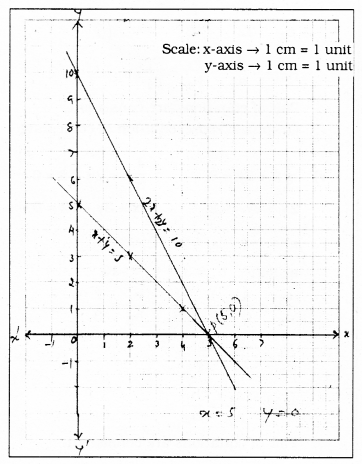
(ii) x – y = 8 ⇒ x – y – 8 = 0
3x – 3y = 16 ⇒ 3x – 3y – 16 = 0
Here, \(\frac{a_{1}}{a_{2}}=\frac{1}{3} \quad \frac{b_{1}}{b_{2}}=\frac{-1}{-3}=\frac{1}{3}\)
\(\frac{c_{1}}{c_{2}}=\frac{-8}{-16}=\frac{1}{2}\)
\(\quad \frac{\mathrm{a}_{1}}{\mathrm{a}_{2}}=\frac{\mathrm{b}_{1}}{\mathrm{b}_{2}} \neq \frac{\mathrm{c}_{1}}{\mathrm{c}_{2}}\)
∴ Linear equations are inconsistenttent.
∴ Algebraically it has no solution.
Graphical representation → Parallel Lines.
(i) x – y = 8
-y = 8 – x
y = -8 + x
| x | 8 | 10 | 9 |
| y = -8+x | 0 | 2 | 1 |
(ii) 3x – 3y = 16
-3y = 16 – 3x
3y = -16 + 3x
\(\quad y=\frac{-16+3 x}{3}\)
| x | 6 | 8 |
| \(y=\frac{-16+3 x}{3}\) | 0.8 | 2.6 |
No solution because it is inconsistent
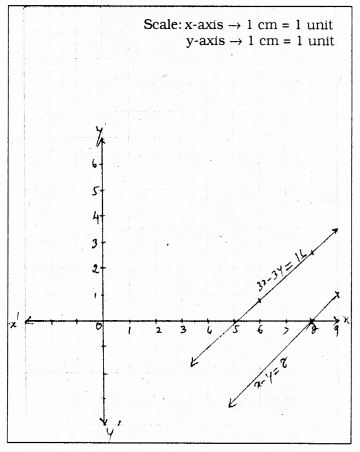
(iii) 2x + y – 6 = 0
4x – 2y – 4 = 0
Here a1 = 2, b1 = 1, c1 = -6
a2 = 4, b2 = -2, c2 = -4
\(\frac{\mathrm{a}_{1}}{\mathrm{a}_{2}}=\frac{2}{4}=\frac{1}{2} \quad \frac{\mathrm{b}_{1}}{\mathrm{b}_{2}}=\frac{1}{-2}\)
\(\frac{c_{1}}{c_{2}}=\frac{-6}{-4}=\frac{3}{2}\)
Here, \(\frac{a_{1}}{a_{2}} \neq \frac{b_{1}}{b_{2}}\)
Pair of equations are consistent. Algebraically both lines intersect.
Graphical Representation :
(i) 2x + y = 6
y = 6 – 2x
| x | 0 | 2 |
| y = 6 – 2x | 6 | 2 |
(ii) 4x – 2y – 4 = 0
4x – 2y = 4
-2y = 4 – 4x
2y = -4 + 4x
\(\quad y=\frac{-4+4 x}{2}\)
| x | 1 | 3 |
| \(y=\frac{-4+4 x}{2}\) | 0 | 4 |
Solution: intersecting point, P (2, 2) i.e., x = 2, y = 2
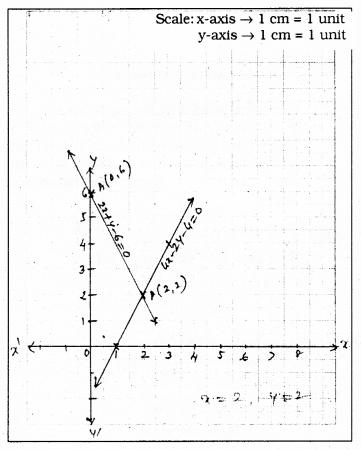
(iv) 2x – 2y – 2 = 0
4x – 3y – 5 = 0
a1 = 2, b1 = -2, c1 = -2
a2 = 4, b2 = -3, c2 = -5
\(\frac{\mathrm{a}_{1}}{\mathrm{a}_{2}}=\frac{2}{4}=\frac{1}{2} \quad \frac{\mathrm{b}_{1}}{\mathrm{b}_{2}}=\frac{-2}{-3}=\frac{2}{3}\)
\(\frac{c_{1}}{c_{2}}=\frac{-2}{-5}=\frac{2}{5}\)
Here, \(\frac{\mathrm{a}_{1}}{\mathrm{a}_{2}} \neq \frac{\mathrm{b}_{1}}{\mathrm{b}_{2}}\)
Pair of equations are consistent.
∴ Algebraically both lines intersect.
Graphical Representation :
(i) 2x – 2y – 2 =0
2x – 2y = 2
-2y = 2 – 2x
2y = -2 + 2x
\(\quad y=\frac{-2+2 x}{2}\)
∴ y = – 1 + x
| x | 2 | 4 |
| y= -1+ x | 1 | 3 |
(ii) 4x – 3y – 5 = 0
4x – 3y = 5
-3y = 5 – 4x
3y = -5 + 4x
\(\quad y=\frac{-5+4 x}{3}\)
| x | 2 | 5 |
| \(y=\frac{-5+4 x}{3}\) | 1 | 5 |
Solution: P(2, 1) i.e., x = 2, y = 1
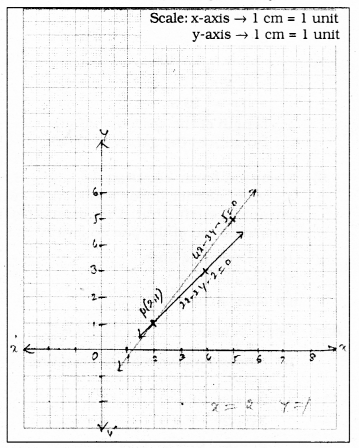
Question 5.
Half the perimeter of a rectangular garden, whose length is 4m more than its width, is 36m. Find the dimensions of the garden.
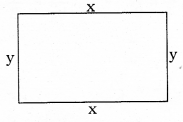
Solution:
Length of rectangular garden be ‘x’ m.
Breadth of rectangular garden be ‘y’ m, then
Length of the garden is 4m more than its width.
x = y + 4 ……….. (i)
x – y = 4
Half of the circumference is 36 m.
\(\frac{2 x+2 y}{2}=36\)
2x + 2y = 72
x + y = 36 …………… (ii)
∴ x – y = 4 (i)
x + y = 36 (ii)
From eqn. (i) + eqn. (ii)

\(\quad x=\frac{40}{2}\)
∴ x = 20 m.
Substituting the value of ’x’ in eqn. (i)
x – y = 4
20 – y = 4
-y = 4 – 20
-y = -16
y = 16 m.
∴ Length of the garden = 20 m.
Breadth of the garden = 16 m.
Question 6.
Given the linear equation 2x + 3y – 8 = 0, write another linear equation in two variables such that the geometrical representation of the pair so formed is :
(i) intersecting lines
(ii) parallel lines
(iii) coincident lines.
Solution:
Linear equation is 2x + 3y – 8 = 0.
(i) Linear equations for intersecting lines:
2x + 3y – 8 = 0
3x + 2y – 7 = 0
a1 = 2, b1 = 3, c1 = -8
a2 = 3, b2 = 2, c2 = -7
\(\frac{a_{1}}{a_{2}}=\frac{2}{3} \quad \frac{b_{1}}{b_{2}}=\frac{3}{2}\)
Here, when \(\frac{\mathrm{a}_{1}}{\mathrm{a}_{2}} \neq \frac{\mathrm{b}_{1}}{\mathrm{b}_{2}}\) Geometrical representation is intersecting lines.
(ii) For Parallel lines :
2x + 3y – 8 = 0
2x + 3y – 12 = 0
a1 = 2, b1 = 3, c1= -8
a1 = 2, b1 = 3, c1 = -12
\(\frac{\mathrm{a}_{1}}{\mathrm{a}_{2}}=\frac{2}{2}=\frac{1}{1} \quad \frac{\mathrm{b}_{1}}{\mathrm{b}_{2}}=\frac{3}{3}=\frac{1}{1}\)
\(\frac{c_{1}}{c_{2}}=\frac{-8}{-12}=\frac{8}{12}=\frac{2}{3}\)
Here, \(\frac{\mathrm{a}_{1}}{\mathrm{a}_{2}}=\frac{\mathrm{b}_{1}}{\mathrm{b}_{2}} \neq \frac{\mathrm{c}_{1}}{\mathrm{c}_{2}}\) hence
Graphical representation is parallel lines.
(iii) For Intersecting lines :
2x + 3y – 8 = 0
4x + 6y – 16 = 0
a1 = 2, b1 = 3, c1 = -8
a1 = 4, b1 = 6, c1 = -16
\(\frac{a_{1}}{a_{2}}=\frac{2}{4}=\frac{1}{2} \quad \frac{b_{1}}{b_{2}}=\frac{3}{6}=\frac{1}{2}\)
\(\frac{c_{1}}{c_{2}}=\frac{-8}{-16}=\frac{1}{2}\)
Here,
∴ Lines are intersecting.
Question 7.
Draw the graphs of the equations x – y + 1 =0 and 3x + 2y – 12 = 0. Determine the coordinates of the vertices of the triangle formed by these lines and the x-axis, and shade the triangular region.
Solution:
x – y + 1 = 0 ………. (i)
3x – 2y – 12 = 0 ……….. (ii)
x – y + 1 = 0
-y = -x -1
y = x + 1
| x | 2 | 4 |
| y = x + 1 | 3 | 5 |
3x + 2y – 12 = 0
2y = -3x + 12
\(\quad y=\frac{-3 x+12}{2}\)
| x | 0 | 2 |
| \(y=\frac{-3 x+12}{2}\) | 6 | 3 |
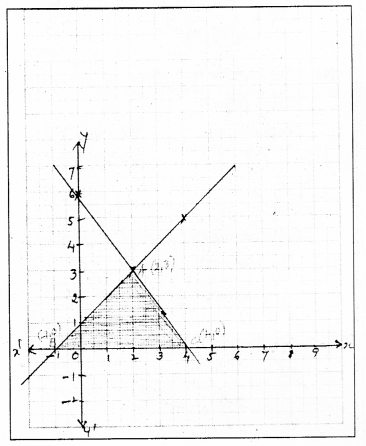
Graphs of these two equations intersect at A. Vertices formed for ∆ABC are,
A (2, 3), B (-1, 0), C (4, 0).
We hope the given KSEEB SSLC Class 10 Maths Solutions Chapter 3 Pair of Linear Equations in Two Variables Ex 3.2 will help you. If you have any query regarding Karnataka SSLC Class 10 Maths Solutions Chapter 3 Pair of Linear Equations in Two Variables Exercise 3.2, drop a comment below and we will get back to you at the earliest.